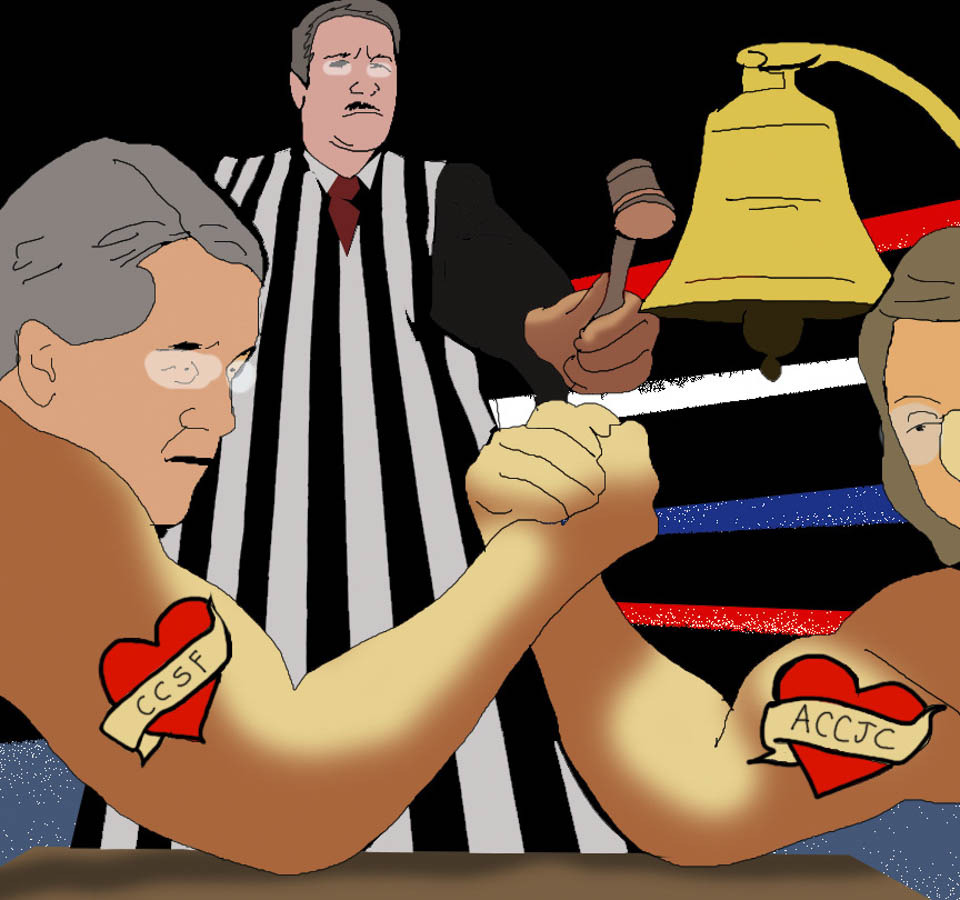Legal maneuvers heat up in SF vs ACCJC trial

By Patrick Fitzgerald
The Guardsman
For a sixth time, Superior Court Justice Curtis Karnow rejected the Accreditation Commission of Community and Junior Colleges (ACCJC) latest arguments to dismiss an injunction against revoking City College’s accreditation.
The injunction became effective on Jan. 2, 2014, when City Attorney Dennis Herrera’s office sued the ACCJC over the makeup of the accreditation team and for conflicts of interest. These issues raised questions about the integrity of the ACCJC’s decision to pull City College’s accreditation as of July 31, 2014.
“What we want from the very beginning is a fair, open (and) transparent accreditation process. That’s what we have been asking for from the very beginning,” said Professor Timothy Killikelly. “We think the ACCJC needs to be held accountable for unfair and illegal practices. No one is above the law.”
In an eight-page ruling issued Oct. 8, Karnow methodically reviewed the ACCJC’s latest briefs filed Sept. 9 and 30. The ACCJC again petitioned the court on seven new grounds for a motion of judgment and thus removal of the injunction.
The City Attorney’s office on Sept. 24, filed an opposition brief refuting ACCJC’s Sept. 9 arguments. This filing maintained the focus of the trial is ACCJC‘s procedural violations and wrongful decision-making.
Karnow has the power to turn back the clock to before the assessment team evaluated City College’s accreditation renewal. Student’s course credits earned at City College after losing accreditation would not be recognized by other accredited colleges and universities.
Dennis Herrera said he was “grateful for a decision that confirms once again that accreditors’ violations are not beyond the reach of the courts or the law.”
“I think it is unfair to the students. I don’t want to feel like I am going to school for nothing,” said student Paulette Brown. “I am going to school because I want to transfer to another college or university to get my bachelor’s degree.”
The Department of Education (DOE) had earlier cited the makeup of the ACCJC’s evaluation team as an issue which contradicted the Commission’s guidelines. The evaluation team included the ACCJC president’s husband, a high number of administrators, and hardly any faculty.
The DOE indicated that not following their own guidelines gave the appearance of a biased evaluation. This appearance gave credence to unfairness allegations and was used by the City Attorney’s office as an argument supporting the need for an injunction.
“I don’t think it is fair at all that they yank it (accreditation) because everyone needs to go to college,” said student Isabel Cohen. “This is a great college for people to go to.”
In June of 2012, the ACCJC issued a “show cause” letter to City College for why the school should be accredited and not terminated. City Attorney Dennis Herrera’s office filed a motion for injunction to prevent the ACCJC from revoking City College’s accreditation in August 2013. On July 3, 2013, the ACCJC decide to revoke City College’s accreditation effective July 31, 2014.
ACCJC’s latest press release dated September 23, said it “believes its accreditation decisions with respect to CCSF have been valid and warranted and that it will ultimately prevail in the lawsuit.”
City Attorney Dennis Herrera’s office in a press release dated October 8 said, “In reaching the conclusion, Karnow largely sided with Herrera’s contention that legal doctrines intended to protect the right of organizations to petition the government to redress grievances would not insulate accrediting agencies from liability for their procedural violations or wrongful decision‐making.”
Barring another attempt by the ACCJC to get the injunction dismissed, People of the State of California versus the ACCJC will go to trial on October 27. City College is the largest community college in California and is set to celebrate 80 years in education.

Comments are closed.